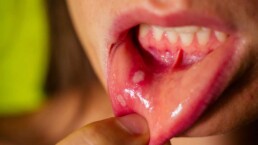Do you have an itchy scalp? You’re not alone. Many people deal with scalp pruritus, or an itchy scalp. It can be caused by dry skin or fungal infections. For mild cases, natural home remedies can offer relief.
Table of Contents
ToggleTry an apple cider vinegar rinse or use organic coconut and peppermint oils. These can help soothe your scalp and improve its health.
Key Takeaways
- Home remedies like apple cider vinegar, coconut oil, and peppermint oil can help soothe an itchy scalp.
- Understanding the underlying causes of scalp itch, such as dry skin or fungal infections, is important for effective treatment.
- Incorporating natural, gentle remedies can provide relief without the potential side effects of harsh chemicals or medications.
- Addressing stress and practicing relaxation techniques can also help manage itchy scalp symptoms.
- While home remedies can be helpful, persistent or severe cases may require medical treatment from a healthcare professional.
Understanding the Causes of Itchy Scalp
An itchy scalp can be frustrating and hard to deal with. Knowing what causes it is key to finding relief. Many things can make your scalp itch, from things around you to your body’s own conditions. Let’s look at what causes this annoying problem.
Common Causes of Scalp Itch
Dandruff is a big reason for an itchy scalp. It happens when your scalp makes too many skin cells. This leads to flakes, dryness, and itchiness. Also, sweating too much, being in the sun too long, and pollution can dry out your scalp, making it itch more.
Other things like seborrheic dermatitis and psoriasis can make your scalp itch. These are conditions that cause inflammation and can affect the scalp. Parasites like head lice or ringworm can also make your scalp itch a lot. In rare cases, skin cancers can start by making your scalp itch.
Knowing what’s causing your itchy scalp is the first step to getting relief. By dealing with the root cause, you can manage the itch and feel better about your scalp.
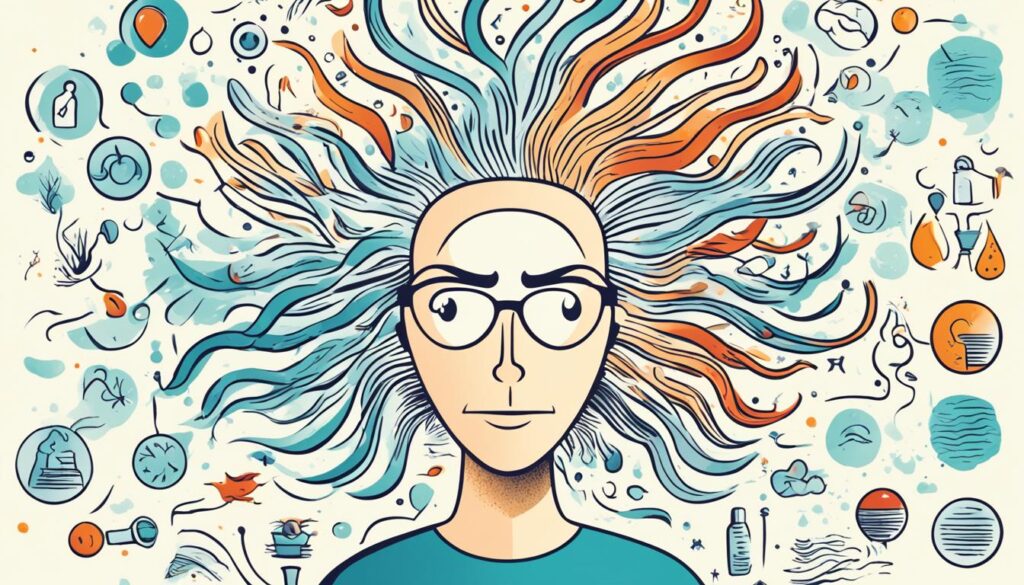
Apple Cider Vinegar Rinse
If you’re dealing with an itchy scalp, apple cider vinegar (ACV) could be a natural fix. This ingredient has been around for centuries, helping with skin and hair issues like scalp irritation.
Using an ACV rinse can help in two ways. First, it has antioxidants and antimicrobial properties. These can soothe inflammation and stop microbes that cause scalp irritation. Second, its acidity can balance your scalp’s pH. This can prevent itchiness and flakiness.
To try an ACV rinse, mix equal parts of organic, raw apple cider vinegar and water in a spray bottle or bowl. Apply it to your scalp, wait a few minutes, then rinse well. Do this a few times a week or when you need it to ease your scalp itch.
Always pick a high-quality, unfiltered ACV with the “mother” for best results. This cloudy, stringy stuff shows the vinegar is pure and full of natural goodness.

An ACV rinse can be a great natural solution, but see a doctor if your scalp itch doesn’t go away or gets worse. They can find out what’s causing it and suggest the best treatment for you.
Organic Coconut Oil Massage
Organic coconut oil is a natural way to ease an itchy scalp. It comes from mature coconuts and is known for fighting fungus and bacteria. About half of a coconut’s fat is lauric acid, which makes the skin absorb the oil well. This makes it great for calming scalp irritation.
Benefits of Coconut Oil
A 2009 study found coconut oil and anise work better than common lice treatments. Using coconut oil on the scalp moisturizes the skin, stops fungal growth, and eases itching. It’s a natural way to get a healthier, itch-free scalp.
To ease an itchy scalp with coconut oil, massage a bit of it into your scalp. Focus on any itchy spots. Leave it on for at least 30 minutes, then wash your hair as usual. Do this a few times a week to soothe and nourish your scalp.
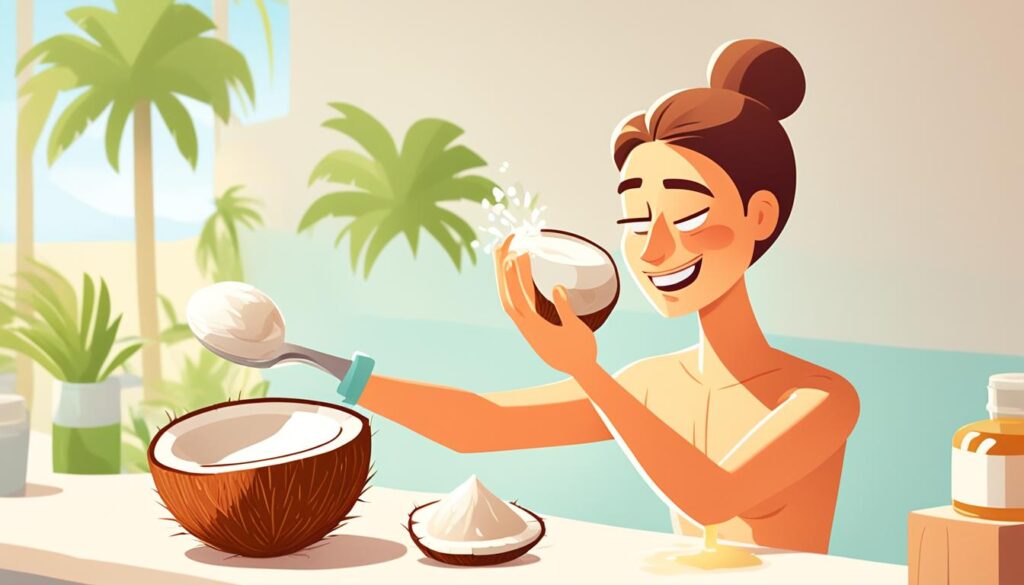
Peppermint Oil Application
If you have an itchy scalp, you might want to try peppermint oil. A study in 2016 showed that peppermint oil can help with scalp itch. Just mix it with water or another oil, like olive oil, and massage it into your scalp before washing your hair.
Here are some tips for using peppermint oil:
- Start with a small amount of peppermint oil, as it can be quite strong. Mix 1-2 drops with 1 tablespoon of water or carrier oil.
- Massage the diluted peppermint oil into your scalp, focusing on any particularly itchy areas.
- Let the oil sit for a few minutes before rinsing and shampooing as usual.
- Repeat this process 1-2 times per day for best results.
Peppermint oil’s cooling effects can ease scalp itch and bring relief. Try it out and see if it helps you!
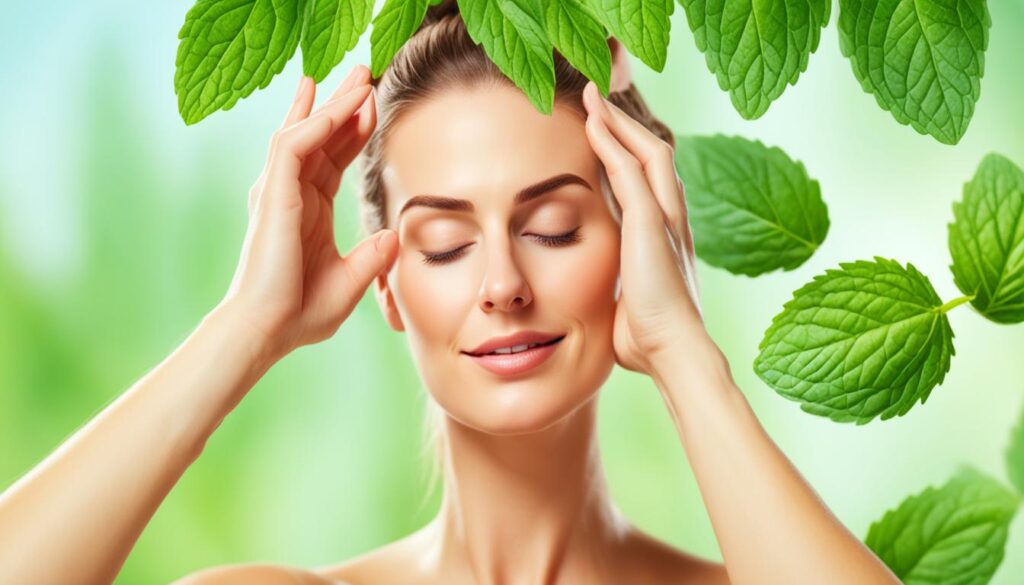
Home remedies for itchy scalp
Apple cider vinegar, coconut oil, and peppermint oil are great for an itchy scalp. But, there are more natural remedies that can help too. These DIY solutions can ease the itch without harsh chemicals.
Tea Tree Oil
Tea tree oil is powerful because it fights germs and reduces swelling. A little diluted tea tree oil on the scalp can ease itchiness. It can also tackle fungal or bacterial infections that cause scalp itch.
Aloe Vera Gel
Aloe vera gel cools and soothes the scalp. Rubbing pure aloe vera gel into your scalp can ease dryness and irritation. It helps calm the itch and inflammation.
Baking Soda
Baking soda is easy and effective for scalp itch. It gently cleans the scalp by removing flakes and extra oil. Mix a bit of baking soda with water, massage it into your scalp, and then rinse.
Try these natural remedies alone or together for relief and a healthier scalp. Always test a small area first to avoid more irritation.
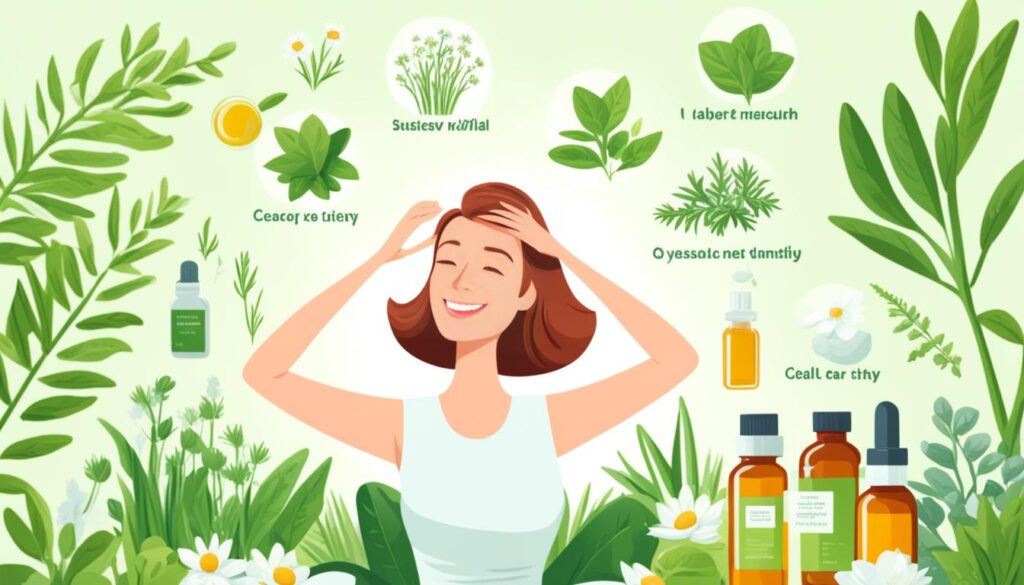
Meditation and Stress Reduction
Managing stress is key to dealing with an itchy scalp. Meditation is a great way to reduce stress and relax. Studies show it helps with skin issues like psoriasis, which often causes scalp irritation.
Meditation uses techniques to calm the mind and help you relax deeply. By managing stress with meditation, you might ease an itchy scalp. A 2021 review found meditation and guided imagery helped psoriasis symptoms, like skin lesions. Adding meditation to your daily routine can help soothe an irritated scalp.
For beginners, there are many resources to start with meditation. Apps, tapes, or podcasts can guide you. Just a few minutes of quiet reflection each day can help with stress and an itchy scalp.
Reducing stress to ease an itchy scalp involves meditation and other techniques. Try different methods to see what works for you.
Medicated Shampoos
If home remedies don’t work, medicated shampoos might be the answer for an itchy scalp. These over-the-counter (OTC) treatments can tackle the root causes of scalp irritation and discomfort.
OTC Treatments for Scalp Itch
A common OTC antifungal option is a zinc pyrithione shampoo. It’s great for treating conditions like psoriasis and seborrheic dermatitis, which often cause an itchy scalp. Salicylic acid and ketoconazole shampoos are also good choices. They target the root causes of scalp itch.
For seborrheic dermatitis, selenium sulfide-based shampoos work well. They help reduce intense itching. These shampoos can manage symptoms and bring relief.
While OTC treatments can help with scalp itch, seeing a healthcare professional is wise if the issue doesn’t get better or gets worse. They can find the cause and suggest the best treatment.
Lifestyle Tips for Managing Itchy Scalp
Dealing with an itchy scalp can be really frustrating. But, there are simple changes you can make to feel better. These tips can help you manage scalp itch and improve your hair and scalp health.
One good way to protect your scalp is to wear breathable headgear in harsh weather. This keeps your scalp safe from the sun, sweat, and extreme temperatures. These things can make itchiness worse.
Regular scalp massages are also helpful. Massaging your scalp gently can boost blood flow. It also helps clear out oils, dead skin, and irritants that cause itchiness. Try adding this to your weekly self-care routine.
Your diet affects your scalp and hair health too. Eating foods full of antioxidants, healthy fats, and water can help your scalp. It can also reduce inflammation that leads to itchiness. Drink lots of water every day to stay hydrated.
By making these lifestyle changes, you can fight itchiness and promote a healthier scalp. This approach can make your scalp more comfortable.
Conclusion
Dealing with an itchy scalp can be really frustrating. But, there are many effective home remedies and lifestyle changes that can help. Apple cider vinegar rinses and coconut oil massages can soothe your scalp. Meditation and medicated shampoos can also help calm your scalp.
By adding these remedies to your hair care routine, you can make your scalp comfortable again. This guide has given you the knowledge and tools to improve your scalp health. It covers the best home remedies for an itchy scalp and how to treat it.
Your scalp is a key part of your body. It needs care and attention. Using natural ingredients and proven methods can get rid of the itch. Try these solutions and say goodbye to scalp discomfort for good.
FAQ
What are some home remedies that may help ease symptoms of an itchy scalp?
Home remedies like coconut oil, apple cider vinegar rinse, and peppermint oil can ease an itchy scalp.
What are some common causes of an itchy scalp?
An itchy scalp can be caused by too much sweating, skin irritation from the sun, pollutants, and sun allergies. Other causes include dandruff, seborrheic dermatitis, psoriasis, head lice, ringworm, and skin cancers.
How can apple cider vinegar help relieve an itchy scalp?
Apple cider vinegar has been used for centuries as a natural remedy. It has antioxidants and antimicrobial properties. The National Psoriasis Foundation suggests mixing it with water and using it several times a week. Rinse your scalp after.
What are the benefits of using organic coconut oil for an itchy scalp?
Organic coconut oil comes from mature coconuts and fights fungus and bacteria. It’s rich in lauric acid, which helps the skin absorb the oil. This makes it great for soothing an itchy scalp.
How can peppermint oil help soothe an itchy scalp?
A 2016 study showed peppermint oil can reduce itchiness. Mix it with water or another oil, like olive oil, and massage it into your scalp before washing your hair.
What other natural remedies may help soothe an itchy scalp?
Tea tree oil, aloe vera gel, and baking soda can also soothe an itchy scalp. Tea tree oil fights germs and reduces swelling. Aloe vera gel calms and soothes the scalp. Baking soda exfoliates the scalp, reducing itchiness and flakes.
Can meditation and stress reduction help with an itchy scalp?
Yes, meditation and stress reduction can help. Studies show they improve psoriasis symptoms like lesions. Reducing stress can help clear up itchy scalps.
What medicated shampoos can help relieve an itchy scalp?
Zinc pyrithione, salicylic acid, and ketoconazole shampoos are good for itchy scalps. They tackle the root causes. Selenium sulfide-based shampoos also work well for seborrheic dermatitis.
What lifestyle changes can help manage an itchy scalp?
To manage an itchy scalp, wear breathable hats, massage your scalp, eat a diet full of antioxidants and healthy fats, and drink lots of water.
Source Links

This article is medically reviewed by Dr. Chandril Chugh, Board-Certified Neurologist, providing expert insights and reliable health information.
Dr. Chandril Chugh is a U.S.-trained neurologist with over a decade of experience. Known for his compassionate care, he specializes in treating neurological conditions such as migraines, epilepsy, and Parkinson’s disease. Dr. Chugh is highly regarded for his patient-centered approach and dedication to providing personalized care.





